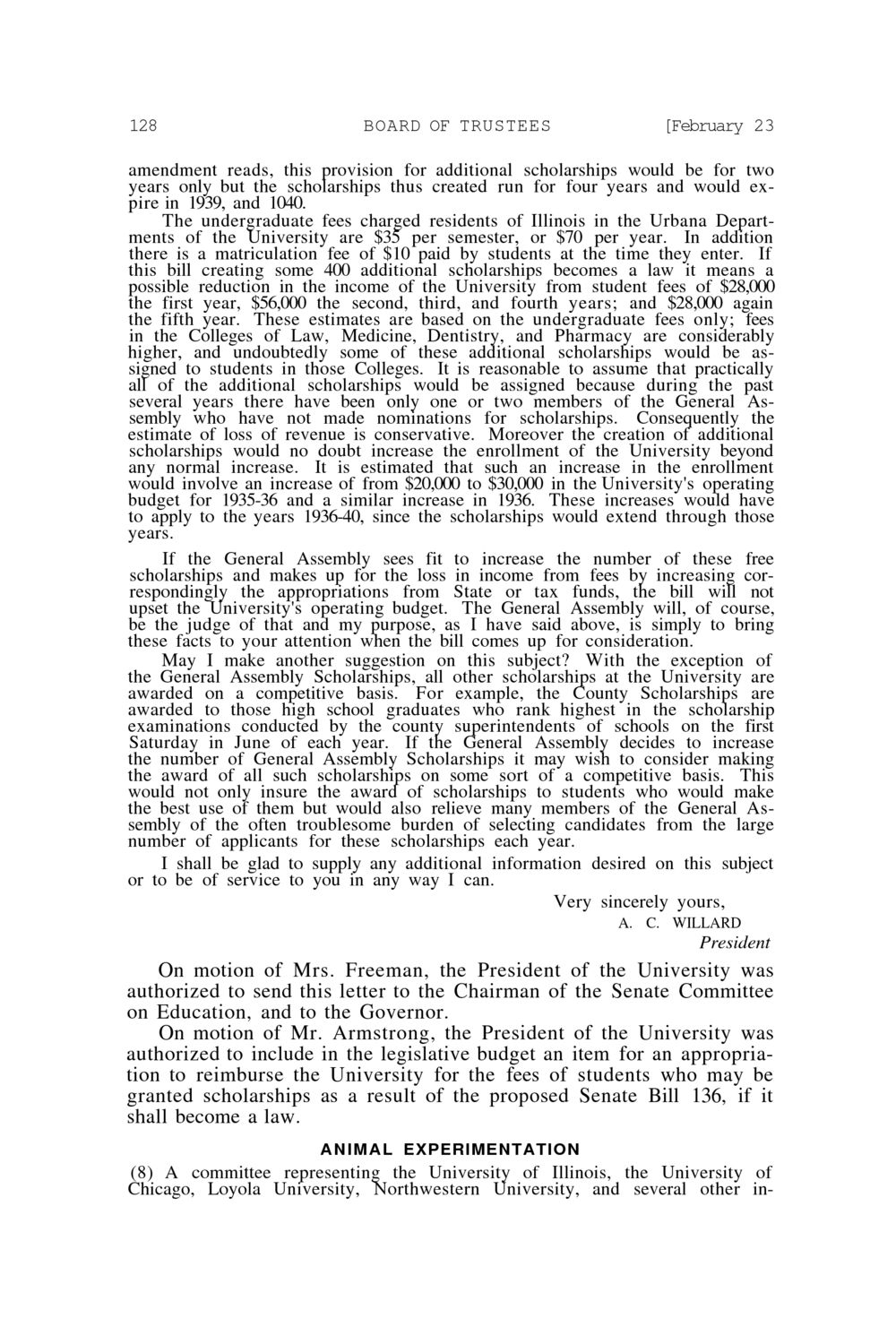| |
| |
Caption: Board of Trustees Minutes - 1936
This is a reduced-resolution page image for fast online browsing.

EXTRACTED TEXT FROM PAGE:
128 BOARD OF TRUSTEES [February 23 amendment reads, this provision for additional scholarships would be for two years only but the scholarships thus created run for four years and would expire in 1939, and 1040. The undergraduate fees charged residents of Illinois in the Urbana Departments of the University are $35 per semester, or $70 per year. In addition there is a matriculation fee of $10 paid by students at the time they enter. If this bill creating some 400 additional scholarships becomes a law it means a possible reduction in the income of the University from student fees of $28,000 the first year, $56,000 the second, third, and fourth years; and $28,000 again the fifth year. These estimates are based on the undergraduate fees only; fees in the Colleges of Law, Medicine, Dentistry, and Pharmacy are considerably higher, and undoubtedly some of these additional scholarships would be assigned to students in those Colleges. It is reasonable to assume that practically all of the additional scholarships would be assigned because during the past several years there have been only one or two members of the General Assembly who have not made nominations for scholarships. Consequently the estimate of loss of revenue is conservative. Moreover the creation of additional scholarships would no doubt increase the enrollment of the University beyond any normal increase. It is estimated that such an increase in the enrollment would involve an increase of from $20,000 to $30,000 in the University's operating budget for 1935-36 and a similar increase in 1936. These increases would have to apply to the years 1936-40, since the scholarships would extend through those years. If the General Assembly sees fit to increase the number of these free scholarships and makes up for the loss in income from fees by increasing correspondingly the appropriations from State or tax funds, the bill will not upset the University's operating budget. The General Assembly will, of course, be the judge of that and my purpose, as I have said above, is simply to bring these facts to your attention when the bill comes up for consideration. May I make another suggestion on this subject? With the exception of the General Assembly Scholarships, all other scholarships at the University are awarded on a competitive basis. For example, the County Scholarships are awarded to those high school graduates who rank highest in the scholarship examinations conducted by the county superintendents of schools on the first Saturday in June of each year. If the General Assembly decides to increase the number of General Assembly Scholarships it may wish to consider making the award of all such scholarships on some sort of a competitive basis. This would not only insure the award of scholarships to students who would make the best use of them but would also relieve many members of the General Assembly of the often troublesome burden of selecting candidates from the large number of applicants for these scholarships each year. I shall be glad to supply any additional information desired on this subject or to be of service to you in any way I can. Very sincerely yours, A. C. WILLARD President On motion of Mrs. Freeman, the President of the University was authorized to send this letter to the Chairman of the Senate Committee on Education, and to the Governor. On motion of Mr. Armstrong, the President of the University was authorized to include in the legislative budget an item for an appropriation to reimburse the University for the fees of students who may be granted scholarships as a result of the proposed Senate Bill 136, if it shall become a law. A N I M A L EXPERIMENTATION (8) A committee representing the University of Illinois, the University of Chicago, Loyola University, Northwestern University, and several other in-
| |